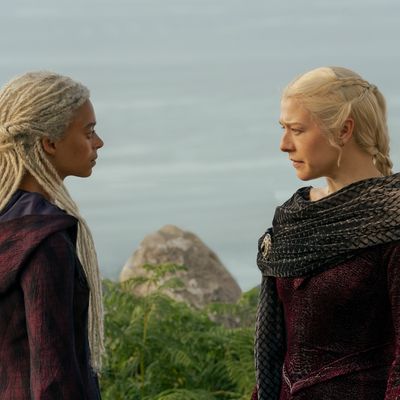
Want to watch House of the Dragon with us? Sign up for our new subscriber-exclusive newsletter obsessively chronicling season two.
Perhaps whispers are more important in a kingdom where everyone is already shouting their enmity. Viserys occupied the Iron Throne for decades and, according to his son, never embraced the need for a Master of Whisperers. Aegon II and Rhaenyra, on the other hand, have both already retained spy chiefs, Larys Strong and Mysaria, respectively. Peacetime rule is more straightforward than the war Viserys’s children are on the cusp of waging, but the parallel between the half-siblings is surely intended to underscore how far both have fallen from the tree. No matter who wins, secrets are the currency now, as valuable to king and queen as sword and coin.
And how many times does a king need to declare that war, am I right? Aegon has been sounding the bells since before his son’s murder. And even now that his and Rhaenyra’s bannermen have fought an unsanctioned proxy skirmish in the Riverlands, Aegon’s small council is suggesting that there might be another path to victory. They could, for example, send a raven to Grover Tully, instructing him to get the pro-usurper Brackens and Rhaenyra-stanning Blackwoods to bury their ancient grudge for a second. Or maybe Aegon’s uncle Ormund Hightower can do it when he arrives months from now. No, Jason Lannister can do it when he gets there from Casterly Rock in a few weeks.
Only Criston Cole — who, after sending Arryk to his death in an embarrassing blunder, seems a little reluctant to even show up to the council meeting — shares Aegon’s sense of urgency. He suggests that he take Harrenhal personally, with whatever force he can muster from King’s Landing. What his army lacks in size, it will make up for in speed. “And dragons?” you might be asking. Nope, no dragons. In a series of narrative moves entirely consistent with House of the Dragon’s long on-ramp to war, the first “battle” happened off-screen, and the first official warring party will be stealthy and dragonless. It’s worth pondering, momentarily, what makes Ser Criston tick. He’s not trying to appease Alicent, who is still pleading for patience from Aegon in her father’s fresh absence. And I can’t believe Criston has any real love for Aegon himself. His whole purpose in this war still appears to be vengeance on the teenage girl who dumped him.
He also has a bit of a chip on his shoulder regarding his humble Dornish origins, it seems. Alicent’s brother, Ser Gwayne, arrives in King’s Landing just in time to insist on joining the battalion against the new Hand’s wishes. Gwayne is a total dick, belittling Criston for his stratospheric rise when really he should be belittling him for killing Arryk. The strange bedfellows march out the gates of the Red Keep together, destined to either come to blows or learn a begrudging mutual respect for each other, methinks. Alicent and Criston make an awkward but not entirely unamorous good-bye — Alicent’s brother spies big sis giving Criston an embroidered hanky from her bosom — and that’s it. It’s on. Wartime.
King Aegon, too, applied to join Criston’s forces but allowed himself to be convinced by Aemond that he was too valuable as a figurehead of the new Westeros to take part in establishing the new Westeros. That minuscule schism leaves just enough space for Larys to wedge himself into Aegon’s confidence and, I’m pretty sure, work him over. Larys has “heard” the council attempted to persuade Aegon to fly to battle so that Alicent and Aemond could wrest control at home. How sharp of Aegon not to fall for the scheme, the Clubfoot flatters, in turn securing an official role in Aegon’s government as Master of Whisperers. Aegon subscribes to the theory that politics is perception. Despite the Brackens’ heavy losses, for example, he wants to call the Battle of the Burning Mill a victory. More important than what actually happened in the council meeting is what people are saying happened there.
Overall, this ruling thing is proving harder than it looks. To replace the Cargyll brothers, Aegon installs some of his buddies to the Kingsguard, and would you believe they’re not taking it seriously? Criston finds them lounging on the castle steps like their high school seniors in June. They laugh in Aegon’s face when he proposes they adhere to their vows of chastity.
Aegon is momentarily miffed by this insolence, but if you can’t beat ’em, join ’em. (As king, though, you’d really think you could just beat ’em.) He and the boyz head out for a night on the town, winding up in one of the Targaryen Brothers’ fave brothels. Aegon’s supposed uncle Ulf — a bastard grandson of Jaehaerys and bastard brother of Viserys and Daemon — is there, holding court like the people’s king of King’s Landing. And so is Aemond, naked and cuddling with Sylvi (again) until his brother’s appearance shames him into giving her up for another to take a turn. Aegon is cruel, whereas Aemond is sensitive. Aegon is feckless, whereas Aemond is lethal.
And Rhaenyra? Rhaenyra is equivocal. In Daemon’s absence, she now has Jace on one shoulder, nudging her toward battle. On the other, we have Rhaenys coolly advocating that her niece try once more to parlay her long friendship with Alicent into reconciliation. And somewhere between them on the war/peace continuum sit the men on Rhaenyra’s borderline traitorous council. In a move that again parallels what’s happening in the Red Keep, her advisers suggest that their battle-shy queen go into hiding for her own safety. That would leave the big, strong men around her to fight the war in her name. As if. Elsewhere, Corlys nicknames them the group “the ditherers of Dragonstone” — a burn as apt as it is sick.
As Rhaenyra mulls things over for a third consecutive episode, she also prepares her children to leave Dragonstone, which seems long overdue. The morbidity rate for royal sons is rising fast. And since Rhaena is now drifting around Dragonstone without a husband (since the death of Lucerys) and without a dragon (since, if you remember, her egg never hatched), she’s the one tasked with accompanying Joffrey, other Aegon, and other Viserys to the Vale. Lady Jeyne Arryn has agreed to ward Rhaenyra’s danger-magnet scion in exchange for the protection of a dragon. I, for one, can’t wait to see the look on her face when Rhaena shows up with the lil’ baby hatchling Tyraxes. Jeyne got pleyed.
Rhaena is upset at her perceived exile, but it’s called the House of the Dragon, sweetie, so you kinda need a dragon to play. Rhaenyra begs her stepdaughter to instead bring her youngest children as far as Pentos and “be the mother to them that I cannot.” To compensate, she sends Rhaena off with a second chance at becoming a fully fledged member of the Targaryen clan: a clutch of unhatched dragon eggs. The girl boards the ship with four eggs, three sons, two hatchlings (and a partridge in a pear tree).
Yes, the motherhood theme returns. Rhaenyra may be a deposed queen, but she’s also just a regular mom, picking up her sons’ toys at the end of a trying day and discovering in the toy box an unopened raven from her childhood confidant and sworn enemy. More explicitly, back in King’s Landing, Helaena acknowledges how motherhood has rendered her indistinguishable. She tells Alicent that she has no more right to grieve than the mothers among the smallfolk who were forced to watch Jaehhaerys’s funeral despite the fact that their own sons die at a higher rate and with less ceremony. “Sadness is a condition of motherhood,” the dowager queen offers without explanation — vaguely profound-sounding gibberish, if you ask me. In these quiet scenes, it’s Helaena who is emerging as something of a mad genius, or at least a prescient kook.
Neither Aegon nor Rhaenyra are on the move themselves, yet the siblings are on a crash course for each other in the Riverlands, where Daemon has recently arrived. Given how many times Harrenhal’s been mentioned this season as a gem of a stronghold, I was expecting the place to be less of a shithole. Alas, the fires Larys lit to kill his kin and become lord of this place have left it in dire condition (not that it ever fully recovered from the dragonfire other other Aegon — Aegon I — laid down during his conquest). Still, Ser Simon Strong, who serves as castellan in his nephew’s absence, falls to Daemon’s knees, pledges fealty to the Blacks, and offers the man supper. Easy-peasy.
Daemon gives some hint of the kind of king consort he plans to be when he insists Simon use the honorific “Your Grace” instead of the crummier, more accurate “my prince”. Next on the agenda, Your Grace would like to see Grover Tully, Lord of Riverrun, bend the knee to Rhaenyra (though presumably, this will be a metaphorical knee as Grover is understood to be somewhat mentally incapacitated and definitely incontinent). But first, Daemon spends a dreary night at Harrenhal, where the draft threatens to blow down his barred door.
Nightmares, too, penetrate his bedchamber on the wind. Daemon dreams of a teenage Rhaenyra — the girl he snuck out of the castle and into the Street of Silk — sewing their own young son’s head back onto his lifeless body. It’s a guilt dream, perhaps — guilt at beguiling his young niece, guilt at ordering the death of a small child. (Or maybe it’s just mental housekeeping — his brain emptying itself of information a waking Daemon would deem unimportant.) Either way, Daemon appears to have slept walked into a small Strong family cemetery. A long-haired woman standing nearby offers a premonition without elaboration: “You will die in this place.” Of his own conscience? Of assassination, as he feared at dinner? Of damp?
Things are going even worse for Aegon’s advance party. For all Alicent’s fear of the impetuousness of her son and her lover, it’s her own brother that leads the Greens and Blacks to the knife-edge of war. Discontent to spend the night in the forest with the rest of the battalion, Ser Gwayne is riding on to a nearby village when Baela, on surveillance duty with Moondancer, sees the men and chases them back beyond the tree line. Because she seems to have something of her grandmother and stepmother’s forbearance, Baela declines to start a forest fire in order to root them out.
Instead, she brings the intel back to the council, who are frenzied. Rhaenyra grants Lord Simon her permission to return to fortify Rook’s Rest, which seems like a good idea given how close to Rosby Criston Cole and his men have already advanced. (Rook’s Rest is but a short sail from Driftmark and Dragonstone.) Given Daemon’s radio silence and the fact there’s no telling when her troops from the north will arrive, the council advocates a more offensive strategy. As you likely will have guessed by now, Rhaenyra tells the council she’ll just have a noodle over it instead.
In truth, though, the Black Queen does more than that. With the help of her newly installed Mistress of Whisperers, a disguised Rhaenyra infiltrates King’s Landing on a fishing rig and apprehends Alicent in the only place the dowager queen ever goes alone — at prayer in the Great Sept. This is Rhaenyra’s one last stab at keeping her father’s peace and his throne all at the same time, but she’s not actually prepared to give anything up. There are no new terms for either woman to propose. Each side has murdered a child of the other, and there’s no amount of repudiation that could fix it.
Instead, Alicent and Rhaenyra debate whether Viserys I really named Aegon II as his heir on his deathbed or not. They waste a few rounds skirting the facts until Rhaenyra begs Alicent to tell her exactly what her father said that night and Alicent obliges. Aegon is “the prince that was promised to unite the realm,” she says, using the same words Viserys used when he first told Rhaenyra about other other Aegon — Aegon the Conqueror and the Song of Ice and Fire. A civil war erupted because the Targaryens recycle their given names with alarming regularity.
Alicent’s misunderstanding is immediately clear to both women, but there’s no takebacks when you’re playing the game of thrones. Who cares if Viserys declared Aegon as his heir or if it was Rhaenyra? In a hundred years, the truth will be lost entirely, if it isn’t already. As Rhaenys told Rhaenyra as they stood over the twin grave of Arryk and Erryk, “Soon they will no longer remember what it was that began the war in the first place.” Is it that someone stole someone else’s crown? Whose? Is it that someone attacked someone else’s son? And who was that, exactly? Jaehaerys? Lucerys? There will be no careful accounting once the dogs of war have been let slip. Did the Brackens and Blackwoods really kill each other because once upon a time Rhaenyra’s son blinded Alicent’s? No, they did it because they’ve wanted to kill each other since before either can remember.
“You know what Aemond is,” Alicent gives Rhaenyra by way of one last warning. It’s cryptic and apologetic, as threatened as it is threatening. She has raised the dogs of war herself and knows the evil that her sons are capable of.
But already Rhaenyra has stopped listening. Her eyes grow flinty as she stares out over a sea of prayer candles. At least in her own mind, she’s done everything she can to avert a bloody battle of brothers and dragons. Aemond is evil, but he desires war more than he cares for its causes. Rhaenyra may prove more dangerous still — a true believer now emboldened to do her worst.
More From House of the Dragon
- House of the Dragon Loves Lamp
- What to Expect Next on House of the Dragon
- House of the Dragon’s Ewan Mitchell Wanted His Nude Scene to Shock You




